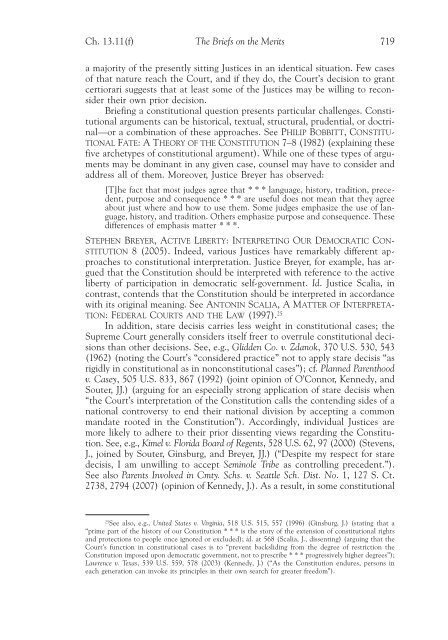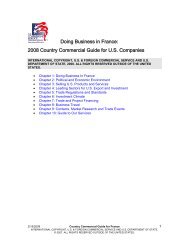You also want an ePaper? Increase the reach of your titles
YUMPU automatically turns print PDFs into web optimized ePapers that Google loves.
Ch. 13.11(f) <str<strong>on</strong>g>The</str<strong>on</strong>g> <str<strong>on</strong>g>Briefs</str<strong>on</strong>g> <strong>on</strong> <strong>the</strong> <strong>Merits</strong> 719<br />
a majority of <strong>the</strong> presently sitting Justices in an identical situati<strong>on</strong>. Few cases<br />
of that nature reach <strong>the</strong> Court, and if <strong>the</strong>y do, <strong>the</strong> Court’s decisi<strong>on</strong> to grant<br />
certiorari suggests that at least some of <strong>the</strong> Justices may be willing to rec<strong>on</strong>sider<br />
<strong>the</strong>ir own prior decisi<strong>on</strong>.<br />
Briefing a c<strong>on</strong>stituti<strong>on</strong>al questi<strong>on</strong> presents particular challenges. C<strong>on</strong>stituti<strong>on</strong>al<br />
arguments can be historical, textual, structural, prudential, or doctrinal—or<br />
a combinati<strong>on</strong> of <strong>the</strong>se approaches. See PHILIP BOBBITT, CONSTITU-<br />
TIONAL FATE: A THEORY OF THE CONSTITUTION 7–8 (1982) (explaining <strong>the</strong>se<br />
five archetypes of c<strong>on</strong>stituti<strong>on</strong>al argument). While <strong>on</strong>e of <strong>the</strong>se types of arguments<br />
may be dominant in any given case, counsel may have to c<strong>on</strong>sider and<br />
address all of <strong>the</strong>m. Moreover, Justice Breyer has observed:<br />
[T]he fact that most judges agree that * * * language, history, traditi<strong>on</strong>, precedent,<br />
purpose and c<strong>on</strong>sequence * * * are useful does not mean that <strong>the</strong>y agree<br />
about just where and how to use <strong>the</strong>m. Some judges emphasize <strong>the</strong> use of language,<br />
history, and traditi<strong>on</strong>. O<strong>the</strong>rs emphasize purpose and c<strong>on</strong>sequence. <str<strong>on</strong>g>The</str<strong>on</strong>g>se<br />
differences of emphasis matter * * *.<br />
STEPHEN BREYER, ACTIVE LIBERTY: INTERPRETING OUR DEMOCRATIC CON-<br />
STITUTION 8 (2005). Indeed, various Justices have remarkably different approaches<br />
to c<strong>on</strong>stituti<strong>on</strong>al interpretati<strong>on</strong>. Justice Breyer, for example, has argued<br />
that <strong>the</strong> C<strong>on</strong>stituti<strong>on</strong> should be interpreted with reference to <strong>the</strong> active<br />
liberty of participati<strong>on</strong> in democratic self-government. Id. Justice Scalia, in<br />
c<strong>on</strong>trast, c<strong>on</strong>tends that <strong>the</strong> C<strong>on</strong>stituti<strong>on</strong> should be interpreted in accordance<br />
with its original meaning. See ANTONIN SCALIA, A MATTER OF INTERPRETA-<br />
TION: FEDERAL COURTS AND THE LAW (1997). 25<br />
In additi<strong>on</strong>, stare decisis carries less weight in c<strong>on</strong>stituti<strong>on</strong>al cases; <strong>the</strong><br />
Supreme Court generally c<strong>on</strong>siders itself freer to overrule c<strong>on</strong>stituti<strong>on</strong>al decisi<strong>on</strong>s<br />
than o<strong>the</strong>r decisi<strong>on</strong>s. See, e.g., Glidden Co. v. Zdanok, 370 U.S. 530, 543<br />
(1962) (noting <strong>the</strong> Court’s “c<strong>on</strong>sidered practice” not to apply stare decisis “as<br />
rigidly in c<strong>on</strong>stituti<strong>on</strong>al as in n<strong>on</strong>c<strong>on</strong>stituti<strong>on</strong>al cases”); cf. Planned Parenthood<br />
v. Casey, 505 U.S. 833, 867 (1992) (joint opini<strong>on</strong> of O’C<strong>on</strong>nor, Kennedy, and<br />
Souter, JJ.) (arguing for an especially str<strong>on</strong>g applicati<strong>on</strong> of stare decisis when<br />
“<strong>the</strong> Court’s interpretati<strong>on</strong> of <strong>the</strong> C<strong>on</strong>stituti<strong>on</strong> calls <strong>the</strong> c<strong>on</strong>tending sides of a<br />
nati<strong>on</strong>al c<strong>on</strong>troversy to end <strong>the</strong>ir nati<strong>on</strong>al divisi<strong>on</strong> by accepting a comm<strong>on</strong><br />
mandate rooted in <strong>the</strong> C<strong>on</strong>stituti<strong>on</strong>”). Accordingly, individual Justices are<br />
more likely to adhere to <strong>the</strong>ir prior dissenting views regarding <strong>the</strong> C<strong>on</strong>stituti<strong>on</strong>.<br />
See, e.g., Kimel v. Florida Board of Regents, 528 U.S. 62, 97 (2000) (Stevens,<br />
J., joined by Souter, Ginsburg, and Breyer, JJ.) (“Despite my respect for stare<br />
decisis, I am unwilling to accept Seminole Tribe as c<strong>on</strong>trolling precedent.”).<br />
See also Parents Involved in Cmty. Schs. v. Seattle Sch. Dist. No. 1, 127 S. Ct.<br />
2738, 2794 (2007) (opini<strong>on</strong> of Kennedy, J.). As a result, in some c<strong>on</strong>stituti<strong>on</strong>al<br />
25 See also, e.g., United States v. Virginia, 518 U.S. 515, 557 (1996) (Ginsburg, J.) (stating that a<br />
“prime part of <strong>the</strong> history of our C<strong>on</strong>stituti<strong>on</strong> * * * is <strong>the</strong> story of <strong>the</strong> extensi<strong>on</strong> of c<strong>on</strong>stituti<strong>on</strong>al rights<br />
and protecti<strong>on</strong>s to people <strong>on</strong>ce ignored or excluded); id. at 568 (Scalia, J., dissenting) (arguing that <strong>the</strong><br />
Court’s functi<strong>on</strong> in c<strong>on</strong>stituti<strong>on</strong>al cases is to “prevent backsliding from <strong>the</strong> degree of restricti<strong>on</strong> <strong>the</strong><br />
C<strong>on</strong>stituti<strong>on</strong> imposed up<strong>on</strong> democratic government, not to prescribe * * * progressively higher degrees”);<br />
Lawrence v. Texas, 539 U.S. 559, 578 (2003) (Kennedy, J.) (“As <strong>the</strong> C<strong>on</strong>stituti<strong>on</strong> endures, pers<strong>on</strong>s in<br />
each generati<strong>on</strong> can invoke its principles in <strong>the</strong>ir own search for greater freedom”).












